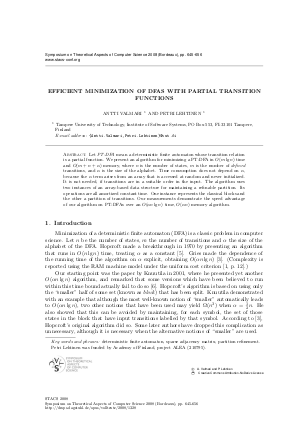Efficient Minimization of DFAs with Partial Transition
Authors Antti Valmari, Petri Lehtinen
-
Part of:
Volume:
25th International Symposium on Theoretical Aspects of Computer Science (STACS 2008)
Part of: Series: Leibniz International Proceedings in Informatics (LIPIcs)
Part of: Conference: Symposium on Theoretical Aspects of Computer Science (STACS) - License:
 Creative Commons Attribution-NoDerivs 3.0 Unported license
Creative Commons Attribution-NoDerivs 3.0 Unported license
- Publication Date: 2008-02-06
File

PDF
LIPIcs.STACS.2008.1328.pdf
- Filesize: 171 kB
- 12 pages
Document Identifiers
Subject Classification
Keywords
- Deterministic finite automaton
- sparse adjacency matrix
- partition refinement
Metrics
- Access Statistics
-
Total Accesses (updated on a weekly basis)
0Document
0Metadata
Abstract
Let PT-DFA mean a deterministic finite automaton whose transition relation is a partial function. We present an algorithm for minimizing a PT-DFA in $O(m lg n)$ time and $O(m+n+alpha)$ memory, where $n$ is the number of states, $m$ is the number of defined transitions, and $alpha$ is the size of the alphabet. Time consumption does not depend on $alpha$, because the $alpha$ term arises from an array that is accessed at random and never initialized. It is not needed, if transitions are in a suitable order in the input. The algorithm uses two instances of an array-based data structure for maintaining a refinable partition. Its operations are all amortized constant time. One instance represents the classical blocks and the other a partition of transitions. Our measurements demonstrate the speed advantage of our algorithm on PT-DFAs over an $O(alpha n lg n)$ time, $O(alpha n)$ memory algorithm.
Cite As Get BibTex
Antti Valmari and Petri Lehtinen. Efficient Minimization of DFAs with Partial Transition. In 25th International Symposium on Theoretical Aspects of Computer Science. Leibniz International Proceedings in Informatics (LIPIcs), Volume 1, pp. 645-656, Schloss Dagstuhl – Leibniz-Zentrum für Informatik (2008)
https://doi.org/10.4230/LIPIcs.STACS.2008.1328
BibTex
@InProceedings{valmari_et_al:LIPIcs.STACS.2008.1328,
author = {Valmari, Antti and Lehtinen, Petri},
title = {{Efficient Minimization of DFAs with Partial Transition}},
booktitle = {25th International Symposium on Theoretical Aspects of Computer Science},
pages = {645--656},
series = {Leibniz International Proceedings in Informatics (LIPIcs)},
ISBN = {978-3-939897-06-4},
ISSN = {1868-8969},
year = {2008},
volume = {1},
editor = {Albers, Susanne and Weil, Pascal},
publisher = {Schloss Dagstuhl -- Leibniz-Zentrum f{\"u}r Informatik},
address = {Dagstuhl, Germany},
URL = {https://drops.dagstuhl.de/entities/document/10.4230/LIPIcs.STACS.2008.1328},
URN = {urn:nbn:de:0030-drops-13286},
doi = {10.4230/LIPIcs.STACS.2008.1328},
annote = {Keywords: Deterministic finite automaton, sparse adjacency matrix, partition refinement}
}
